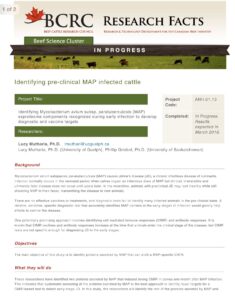Identifying Pre-Clinical MAP Infected Cattle
Mycobacterium avium subspecies paratuberculosis (MAP) causes Johne’s disease, a chronic infectious disease of ruminants. Infection normally occurs in the neonatal period when calves ingest an infectious dose of MAP. The clinical, irreversible and ultimately fatal disease does not occur until years later. In the meantime, animals with preclinical Johne’s disease may look healthy while still shedding MAP in their feces, transmitting the disease to new animals.
There are no effective vaccines or treatments, and diagnostic tests fail to identify many infected animals in the pre-clinical state. Research currently underway and funded by the National Check-off and Canada’s Beef Science Cluster is working to identify proteins secreted by MAP that can elicit a MAP-specific cell mediated immune response. A reliable, sensitive, specific diagnostic test that accurately identifies MAP carriers in the early stages of infection would greatly help efforts to control the disease in beef herds.
To learn more about this research, see the BCRC fact sheet
Click here to subscribe to the BCRC Blog and receive email notifications when new content is posted.
The sharing or reprinting of BCRC Blog articles is welcome and encouraged. Please provide acknowledgement to the Beef Cattle Research Council, list the website address, www.BeefResearch.ca, and let us know you chose to share the article by emailing us at [email protected].
We welcome your questions, comments and suggestions. Contact us directly or generate public discussion by posting your thoughts below.
